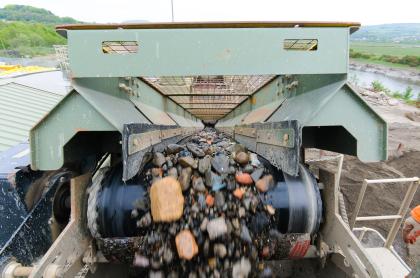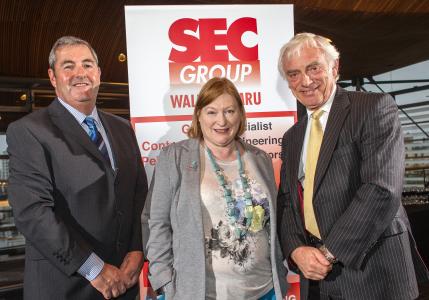Responsible Retrofit of Traditional Buildings
 |
The challenges facing the construction industry working on the existing building stock has never been greater. Balancing the requirements of the ever increasing demands of regulations and greenhouse gas emission reduction directives and the need to protect the fabric of the structure without clear, independent guidance is the game of Russian Roulette that clients, home owners and contractors are now faced with. The Sustainable Traditional Buildings Alliance (STBA) was created by mainstream sustainability and heritage organisations across the UK to act as a forum for sustaining and improving traditional buildings, with Wales represented by Cadw. With over one third of the Wales building stock traditionally built, the STBA is particularly relevant. The Responsible Retrofit of Traditional Buildings report, produced by STBA and sponsored by the Department for Energy and Climate Change (DECC) should provide a wake-up call to the vast majority of those working with traditional buildings but lack the knowledge to do so properly. The report points out the difference between traditional buildings and others along with retrofit risks and benefits. Some content should come as no surprise, such as good repair and maintenance is the most sensible ingredient of energy conservation. The report also points out that many common activities are based on relatively little or shallow research. For example there aren't any internal wall insulation systems which have been tested in situations that properly represent real life situations. Recent drivers for change have been based on limited understanding of how buildings perform, with limited concern on the potential damage that may be caused by an incorrect intervention. It is time to take stock of the issues that face the industry, provide clear independent guidance and highlight the risks posed by changing the performance of the fabric of buildings without careful consideration of the building ‘s condition. The one fits all solution does not exist, so we need to recognise the importance of getting the surveys and assessments carried out correctly, factoring in all of the issues and not just some of them depending on the agenda of the day. For more information see the Retrofit Buildings website.

 |
 |
A New Recycling Aggregate Report Published
 |
The CEW Waste team has published a new report that will, after adoption, divert significant volumes of waste materials to minor engineering schemes consequently avoiding landfill. A Specification for Recycled Aggregate for Minor Schemes (RAMS) builds upon a series of reports by research bodies and practitioners, covering research carried out for CEW on recycled inert aggregate across Wales. The requirement of the specification originated from the recognition that large amounts of high quality virgin aggregates are being used as sub-base materials for minor schemes when alternative more sustainable options are available. The minor engineering schemes where recycled aggregate can be used include areas where very low traffic load is imposed e.g. car parks, cycle paths, estate roads and footpaths. Traditionally there has been doubt and concern about the performance of the recycled alternative options to virgin stone. The RAMS specification is based on a series of research projects carried out on recycled aggregate and gives clear guidelines which will allow the highway engineer to specify recycled aggregate with confidence. The benefits of using recycled aggregate for minor schemes will ensure considerable contribution to the landfill diversion targets quoted in the Welsh Government waste strategy Towards Zero Waste and lessen the demand on limited sources of virgin stone which should be restricted to more demanding engineering schemes. CEW was specifically funded by Welsh Government Aggregate Levy Sustainability Fund to develop this specification and CEW set up a RAMS Steering Group and worked in collaboration with Welsh Government Waste Strategy Branch to bring the findings together. Paul Jennings, CEW Director of Construction and Demolition Waste Programme feels that there has been a need for change when it comes to minor works design. He said: “ Engineers need to recognise that when designing a footpath there really is no justification for adopting the same criteria as if they were designing the M4 motorway – get the risk in proportion.“

 |
 |
Built Environment Sustainability Training Strategy in Wales
 |
CEW is committed in achieving the Welsh Government’s aspirations towards sustainable development. An important element of the Welsh Government’s Towards Zero Waste objectives is to increase green skills in the built environment sector. The Built Environment Sustainability Training (BEST), funded through Cardiff University by the European Social Fund (ESF), supports the Welsh Government objective by planning a long-term educational strategy for Wales. The programme will be developing training and up-skilling for people working in the Welsh sustainable energy and built environment sector - such as architects, engineers, crafts people and skilled workers. BEST works across five key theme areas including waste, water, off-site and on-site construction and low carbon energy production. Our role within the programme is to lead the waste theme of the project. The key areas within the waste theme are waste minimisation and prevention including the design to minimise waste and deconstruction skills including skills for the promotion of reclamation and reuse of materials. We are currently carrying out an extensive skills needs analysis to gather the necessary data from the experts in the field. The second phase of the programme will include developing and delivering training courses from July 2013. We will be contacting construction professionals to discuss where the gaps are in training. If you have any information or can assist in any way please contact us via the CEW BEST page.
 
 |
 |
What's the Big Capital Funding Idea?
 |
Last month saw the confirmation that the Welsh Government and Whitehall had reached agreement regarding devolved borrowing power. This gives Wales a much stronger position from which it plan how capital funding is allocated. The confirmation of devolved borrowing also means that now is the time to campaign for a long term capital funding plan that will create a world class infrastructure for Wales. CEW hopes to achieve this by working with the Government via the launch of a Major Project Delivery Task Group. This group, drawn from industry leaders and their customers will be charged with liaising directly with Welsh Government to champion a vision for Wales and the pursuit of collaborative procurement processes. We want to encourage industry and Government to think big. If for example, Glasgow can host the 2014 Commonwealth Games why can’t Cardiff host the 2026 Games? Why not create bolder and far broader plans for a strategic vision that puts Wales at the forefront of the UK, Europe and global business? We want to ensure Welsh capital projects are commissioned that deliver outstanding facilities for Welsh people and are designed, built and maintained with a focus on whole life costs and for the benefit of the local communities around them. We will be working with the Government to develop the Major Project Delivery Task Group and revealing more details to the industry and CEW stakeholders over the next few weeks.

 |
 |
SEC Group Wales Commits to Procurement Reform
 |
The Specialist Engineering Contractors’ (SEC) Group Wales was formally launched at the Senedd in October. They key aim of the group that has been active for some time, is to improve and modernise procurement and delivery across the Welsh construction sector – to the long-term benefit of the customer, the taxpayer, the industry and the Welsh economy as a whole. The group will work closely and collaborate with the Welsh Government, Constructing Excellence in Wales and other construction industry bodies to reach its objective. A Manifesto for Welsh Construction was published at the event. The SEC Group Wales manifesto focuses on three key areas including delivering “more for less” through an inclusive approach to construction procurement and delivery, reducing waste and maximising efficiency by ditching outdated industry practices, and the need to acknowledge and prioritise those engineering specialists who have invested significantly in their own “green” credentials. Chairman Mel Roberts confirmed SEC Group Wales’ ongoing commitment to implementation of proposals for procurement reform contained in the Maximising the Impact of Welsh Procurement Policy report, which was submitted to the Welsh Government in August this year. “Such implementation is essential not only to add value for the taxpayer, but also to meet the challenging energy efficiency and carbon reduction targets to which the Welsh Government is fully and publicly committed,” Mr Roberts said. Milica Kitson, chief executive of Constructing Excellence in Wales, praised SEC Group for its support of the Latham and Egan agendas over many years, and for its persistence in “proving the business case for procuring and delivering construction in a more holistic way”. The launch event was sponsored by Edwina Hart MBE, Welsh minister for business, enterprise, technology and science. She said: “I am delighted that SEC Group Wales shares the Welsh Government’s aspirations in terms of enhancing the business environment for small and medium-sized enterprises (SMEs), improving payment security for all firms involved in the construction supply chain, and reducing the financial and administrative burden imposed by unnecessarily complex pre-qualification arrangements.” TBC. In closing the proceedings, SEC Group chairman Trevor Hursthouse OBE reminded his audience of the importance of “SMEs and micro-businesses” to the construction industry, which would be unable to operate without their input, in Wales as elsewhere in the UK. Secretary of SEC Group Wales is Andrew Marchant, who combines the role with that of manager of the Building & Engineering Services Association (B&ES) in Wales. 
The launch event was sponsored by Edwina Hart MBE, minister for business in the Welsh Assembly Government – seen here with SEC Group Wales chairman Mel Roberts (left) and SEC Group chairman Trevor Hursthouse OBE.
 |
 |
Collaborative Working Brings Excellent Results
 |
Why do people doubt the arguments in favour of collaborative working? Apparently it is lack of evidence – there is no proof. But that’s wrong. There is plenty of evidence that collaborative working is delivering excellent results for Wales.
Let’s ask another question. Why does the Welsh Government back the concept of collaborative procurement? Why? Because our studies of best practice show that collaborative working, early team integration, a focus on quality and the involvement of the end user are all essential elements in delivering value. Indeed, the argument follows that it’s only by taking a longer term and holistic approach that Government policies and targets to reduce construction waste, increase community benefits and increase value for investment in construction can be achieved.
Collaborative working is also good for business and communities.
Clients have a key role in this. By working with their supply chain through their Designed for Life framework NHS Wales Shared Services Partnership have reduced capital costs, shortened delivery times, increased cost and time certainty, reduced accidents and defects, increased sustainability ratings and increased the use of local suppliers. That’s a pretty impressive record achieved through sensible procurement and collaborative behaviours.
In terms of supply chains consider the work done by Leadbitter at Newport High School in 2009 compared with its 2012 award winning work in Llanwern School. Both projects were outstanding examples of waste management but through collaboration the teams involved continued to innovate and were able to increase their diversion of waste from landfill rates to almost 100% over the two projects. Even as we speak the delivery team are employing the same principles at Gateway to the Valleys School with Bridgend CBC. As part of CEW’s Exemplar programme this project is pushing the boundaries even more strongly.
The Blaenavon Community Campus project developed as a part of a partnership framework over the past seven years between Torfaen CBC and Kier Wales is a great example of how trust developed between the client and supplier through their long term team relationship. Before the relationship started typically less than 50% of construction investment was spent locally, by 2012 it was 87%. The climax of the framework was the completion of the 450 pupil primary school – finished early, in budget, with zero accidents, up-skilling of 34 local people and for every £1 spent on the project £1.84 was generated locally.
It is unlikely such results could have been achieved any other way than via collaborative working. So, we want to put the argument to bed, once and for all.
We have the evidence and over the next few weeks and months we will make every effort to remind everyone in property and construction that collaborative working is the route to delivering a first class Welsh built environment.

Newport High
 |
 |
CEW LinkedIn Group Launched
CEW has launched a LinkedIn Group which will allow anyone working within the industry to join the discussion online about the built environment in Wales. The CEW group aims to bring together businesses, professionals in the construction sector and organisations throughout Wales. The group will work as an open networking, discussion and sharing platform for professionals within the industry. We will also post recent industry news, events and jobs for the group members to view and comment. The group is aimed at anyone within the supply chain with an interest in the built environment in Wales. Make your views heard and join the LinkedIn CEW group.
SE Wales Best Practice Event – Funding Welsh Infrastructure – Finding the right models
 |
As a nation we know how important it is to our economy and to our economic prospect that we have a robust infrastructure in place. The Wales Infrastructure Investment Plan (WIIP) sets out the Welsh Government’s aspirations for the future and public sector organisations across Wales have their own plans in place to deliver new infrastructure across the health, education and highway sectors. However, funding these programmes will be no mean feat. The economic downturn means that all public sector organisations are struggling to acquire the funds necessary to deliver these plans. Against this backdrop the need for alternative funding models to take forward our infrastructure improvements has never been greater.
CE Wales' South East Best Practise Club has pulled together three key speakers from Wales, Scotland and the Netherlands to present their proposals to “bridge the funding gap”. This must-attend conference will bring together funders, developers and clients from across Wales and beyond to debate, in a “Question Time” environment, the merits of the three different funding models and the opportunities to apply them in a Welsh context.
This morning conference will be held on the 6th December 2012 at the Wales Millennium Centre and will be hosted by BBC Wales’ news and sports presenter Frances Donovan.
The conference agenda is available on the CEW website. To reserve your place please email us stating your full contact details and the names of all delegates wishing to attend or see more information on our events page.
 |
 |
RSAW Looking to Appoint a Director
Royal Society of Architects in Wales (RSAW) is looking to appoint a director to work in their Cardiff office. The Royal Society of Architects in Wales/Cymdeithas Frenhinol Penseiri yng Nghymru (RSAW) is part of the Royal Institute of British Architects (RIBA) and is the voice for architects and architecture in Wales. Operating in a home nation with independent planning, procurement and building regulations, it balances its activities between important political lobbying; providing an extensive programme of activities for its 800 members; and promoting architecture through public and specialist events. For more information see the RIBA website.
|